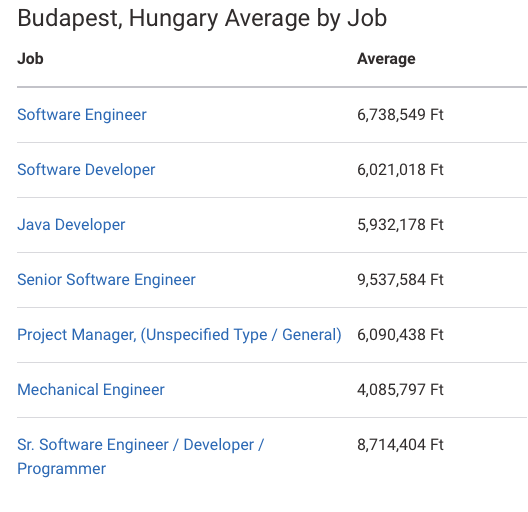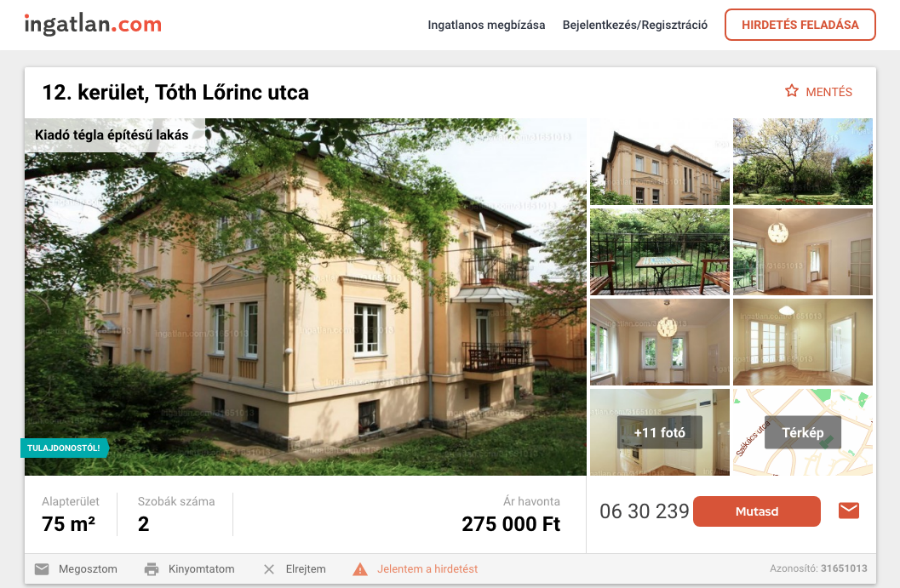
Hello, Habr! We want to talk about countries for IT migration: we have prepared a material about moving to Budapest. Yes, this is not the most popular destination for IT professionals. But cultural proximity, prices are lower than usual European ones and, most importantly, the offices of FAANG and other IT giants are arguments to consider Budapest to change the location. Is it easy to get a job, how much are programmers paid, how to find an apartment - the answers to these and other practical questions are in our article.
Budapest and IT
According to research by analytical company Mercer, Budapest was included in the top 100 cities in the world in terms of living standards in 2019. The capital of Hungary took 76th place, ahead of such cities as Abu Dhabi (78), Tel Aviv (104) and Moscow (167). In addition, the authors of a 2018 study by Brookings University ranked Budapest as an advanced economy based on gross national income. In Hungary, after the pandemic, a crisis began - but mainly it concerns tourism and the entertainment industry .
The information technology sector is well developed in Hungary: it is one of the main components of the country's GDP ( share of 10% ) along with mechanical engineering, electronics and food industries, and pharmacology. Offices in Budapestthere are such companies as Microsoft, Google, IBM, Hewlett- Packard (HP), Prezi ( the latter even made a guide on a loved Budapest). Hungary is a popular IT outsourcing destination, with EPAM and Tata Consultancy Services represented in this niche, for example.
At the same time, according to Numbeo and Mercer (2020), the cost of living in Budapest is lower than in many other European cities (for example, Prague, Berlin, Hamburg, Limassol). All this, plus the fact that Hungary is part of the European Union and the Schengen area, makes the country and its capital an attractive option for relocating IT professionals.
Job, salary and taxes
There are a lot of jobs in Hungary: there is a shortage of labor in the country , tens of thousands of vacancies remain unfilled every year. The government is trying to attract new specialists from countries outside the EU. In the field of IT, the situation is even more acute , so a good specialist will always find a job.
Hungary is not the richest country in the European Union , and salaries there are lower compared to Western Europe or the United States. But income has been growing in recent years . According to statistics , the average salary in Hungary in May 2020 was 398,800 forints before taxes or 99,700 rubles (as of August 26, the rate is 0.25 rubles per 1 forint). For representatives of the IT sphere, it may be higher. So, according toAccording to Glassdoor , an average developer in Budapest receives a salary of about 485,000 forints, or 120,000 rubles and above - this is the senior level.

Developer Jobs in Budapest
According to PayScale, the most popular jobs are Software Engineer, Software Developer, and Java Developer.

Annual income of IT specialists according to PayScale

Annual income of IT specialists in different companies according to PayScale
To find a job in Hungary, you can use the following sites:
Also, Hungarian recruiters actively use LinkedIn, so you can try to establish contact with them on this social network.
A nice bonus: Budapest is not a very centralized city, business centers are "spread" over it evenly, which will eventually allow finding a job closer to home.
In 2013, a tax reform was carried out in Hungary, as a result of which all employed residents of the country pay an income tax of 15%. In addition, there are pension contributions (10%), health insurance premium (7%), and unemployment tax (1.5%) - then if you lose your job, you will receive benefits. For all employed citizens, the tax rate is 33.5%. You can calculate the exact amount of taxes using calculators like this .
Legalization
Foreign workers have the right to count on obtaining a residence permit in Hungary - the holders of a residence permit can leave the country for no more than 90 days a year. A residence permit is given for a period of six months to three years, you can work with it - if it is marked as Employee. If you move with your family, they will also receive a residence permit, but without the opportunity to get a job. After obtaining permanent resident status (permanent residence) - this can be done in three years - they will be allowed to live abroad for up to six months.
To obtain a residence permit, documents can be submitted to the Russian Embassy or the Migration Service of Budapest. If you plan to relocate, the employer can submit the documents.
To obtain permanent residence, knowledge of Hungarian is not required, it is issued for a period of five years, then an extension is required. To obtain citizenship, you already need to pass a language exam. Hungary does not in any way limit the ability of people to have two or more citizenships, which is quite beneficial.
If you plan to deal with the issues of moving and communicate with government agencies on your own, then you will need an interpreter to go to institutions: few people speak English in the migration service. Documents will also need to be translated, for example, here . Among other things, it will not be superfluous to establish cooperation with an experienced lawyer who will help you deal with not always simple and obvious legislation.
Prices, housing and transport
According to Numbeo, in general, living in Budapest is cheaper than in many European cities: in terms of high cost, the city ranks 169 out of 239. Of course, relative to Moscow, it is difficult to unequivocally determine whether prices are lower: there is something both more expensive and cheaper. So, for example, the cost of renting a one-room apartment in the center is estimated almost 2 times lower than in the Russian capital, and some products, for example, milk and cheese, are more expensive , although according to travelers' reviews their quality is higher.
The Danube divides Budapest into two parts: Buda and Pest. There are 23 districts in the city(district). The closer to the river, the more tourists. The most prestigious are the 2nd and 12th districts of Buda: they are on a hill, quiet and green, family expats prefer to settle here. In Pest, there are the most famous sights, ruin bars, hangouts, shops. Immigrants with experience speak negatively about the standard of living and the crime situation in the eighth district (especially in its depths) and do not recommend it to newcomers.

Districts of Budapest. Image: Wikimedia commons
Renting an apartment in Budapest is cheaper than in Moscow, but there is a lot of competition for long-term rentals. It is better to lay a few months on searches. Moreover, the ideal time for this is June-July: many apartments are vacated by students, and in the fall it is difficult to rent something cheap. Like us, here we have our own "Cyan" - a service calledIngatlan.com , Alberlet and Facebook groups Foreigners in Budapest and Rent a flat / room in Budapest .
In a prestigious area, the rental price for a two-bedroom apartment starts at about 200,000 forints (50,000 rubles). In simpler areas, you can find housing cheaper: about 130,000 forints (32,500 rubles). The studio can be rented for 128,000 forints (32,000 rubles) in the 6th, 7th, 8th district and for 176,000 forints (44,000 rubles) closer to the central districts.

An example of an apartment in the twelfth district of Buda
When renting, a contract is concluded. This document will definitely be required when applying for a residence permit. Most often, the minimum rental period is 1 year. The deposit is paid 2 months in advance, and, as a rule, it is not refundable if the tenants leave early.
The amount of utility bills depends on whether the house has electric heating or gas heating. Electricity costs on average about 5,000 forints (1,250 rubles), gas charges fluctuate in the winter and summer seasons (approximately 20,000-25,000 forints, 5,000-6250 rubles). In addition, you need to pay the owner a utility fee for cold water, cleaning the entrance, and garbage disposal (around 10,000 forints - 2,500 rubles). You can find houses where the total utility bills will cost 16,000–32,000 forints (4,000–8,000 rubles).
Payment for utilities and other services is a matter where inaccuracies cannot be allowed. In case of non-payment within a couple of months, the entire "communal" can be turned off, and if the previous tenant has accumulated a debt for the Internet, then new tenants will not be connected until they pay the debt to the provider. And nothing can be done about it, because, as a rule, there can be only one provider in the house.
Budapest has a well-developed public transport network (there is even a subway), everything is clean and works on schedule. You can view it, as well as the traffic and stop scheme in the local Yandex.Transport - BKK FUTÁR application ( Android , iOS ) or on the websitecarrier company BKK. At the same time, the rules are quite strict: free riders are actively caught. Even a tourist who simply does not figure out how to validate a purchased ticket will be fined. 1 trip costs 350 forints at the ticket office and 450 for the driver (88–110 rubles).
Taxis are heavily regulated here - in particular, because of this , Uber left the country , so it is expensive and not so convenient. Instead, Bolt (Taxify) .
Alternatively, you can rent a bike: MOL Bubi (500 forints or 125 rubles for 24 hours of rental), Donkey Republic (1050 forints or 262 rubles for 1 hour of rental). Both services have applications for Android and Ayos with English support - register, pay, ride.
SIM cards can be bought without local documents, but then the tariff will be expensive. For more favorable conditions, you will need a residence permit card and registration. There are several mobile operators in Budapest that offer a wide variety of tariffs: Vodafone , Telenor , Telekom . The Vodafone tariff with two gigabytes of mobile Internet, 100 minutes of calls and unlimited social networks costs 2990 forints per month (750 rubles). Life hack: often when paying at the provider's office, you can save up to 500 forints.

Mobile tariffs
Banking fees are quite high, and the websites, online banking and applications of most financial institutions are outdated and seriously lose to the products that users from Russia are used to.
Communication, entertainment and shopping
One of the most important features of a country is its language. The overwhelming majority of Hungary's 9.8 million inhabitants speak Hungarian, English is known mainly by young people. Like Finnish and Estonian, Hungarian does not belong to the languages of the Indo-European group, but belongs to the Finno-Ugric group, quite different from more familiar languages, and therefore it is not easy to learn it.
If you want to learn the language, courses can be found at the Russian Cultural Center , at the Eotvos Institute and in the Facebook group: Expat Info .
Budapest is not a very big city; only about 1.7 million people live here. However, it is not boring here: festivals are regularly held - which is just the cult Sziget ! Volt can be found nearby, Strand and a dozen more summer open-airs.
Meetings and street movie screenings are still taking place now that musical performances have been canceled due to the pandemic - follow their social media or event pages . In addition to a huge list of festivals, Budapest is known for its nightlife, clubs, bars in ruins , beer gardens, thermal baths and baths (the most famous: Gellert , Széchenyi , Rudas ), theaters and opera, galleries - in general, there is entertainment for every taste.

How do you like the lineup in 2019? Hope 2021 doesn't disappoint
As for shopping, there are several hypermarket chains in Budapest (TESCO, Auchan, SPAR, Prima, Aldi and Lidl.), Some of them work 24/7. These shops are usually located not in the city center, so you need to drive to them.
At TESCO, a kilogram of potatoes costs 150–250 forints (40–60 rubles), a liter of milk - 360 forints (90 rubles), Edam cheese - 1,990 forints (500 rubles) per kilogram, a dozen of C0 eggs - 600–700 forints (about 170 rubles ), beef - 2,000-3,000 forints (500-700 rubles) per kilogram.
Until recently, there was a law banning shopping on Sundays, but now it is no longer in force, although many shops close on weekends around lunchtime. However, in Hungary nothing is open on public holidays: shopping centers, shops and supermarkets are closed. There is only a chance to have a bite to eat at a cafe in the tourist center.
If you need to find something of the things - there are Hungarian "Avito": Vatera , Jófogás . Second-hand shops are very popular: for example, here is a selection from the well-known insider website WeLoveBudapest. The most fashionable are in the seventh district, along with designer boutiques.
Travel: in winter you can go to the Dolomites, in summer - to Lake Balaton, to the "Hungarian Sea". And of course, from Budapest you can ride all over Europe: to Bratislava by train - 2 hours 40 minutes, a direct bus goes to Vienna for 3 hours, and it takes 1.5 hours to fly to Berlin. Remember the Hungarian low-cost airline WizzAir ? They have a club , it costs 29.99 € per year for you and your fellow traveler, and it pays for itself pretty quickly.
Useful links:
- Check in which district the street is located - there are overlaps of names in different areas.
- An online archive of Hungarian photographs - just to get into the spirit of the times.
- A map of drinking fountains - where you can pour a glass of water - will come in handy in the summer. (There is a handy application).
Total
Despite certain difficulties like not the simplest language, decent taxes and not always obvious legislation, living in Budapest is comfortable: a rather mild climate, infrastructure and prices for many goods and services should satisfy even demanding residents of large Russian cities.
And most importantly: Hungary is a country with a fairly developed IT sphere, a developer here can find a lot of opportunities for implementation. Budapest is a city with many attractions, from where you can easily reach many interesting places in Europe.
If you are thinking about moving - and not only to Hungary - vacancies with relocation can be found in our bot @ g_jobbot . Join us!